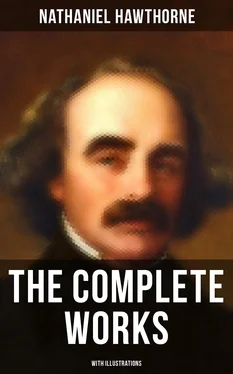“She is well in health. She was so, at least, last night,” replied Dr. Melmoth unable to meet the eye of his friend. “But — but I have been a careless shepherd; and the lamb has strayed from the fold while I slept.”
Edward Walcott, who was a deeply interested observer of this scene, had anticipated that a burst of passionate grief would follow the disclosure. He was, however, altogether mistaken. There was a momentary convulsion of Mr. Langton’s strong features, as quick to come and go as a flash of lightning; and then his countenance was as composed — though, perhaps, a little sterner — as before. He seemed about to inquire into the particulars of what so nearly concerned him, but changed his purpose on observing the crowd of children, who, with one or two of their parents, were endeavoring to catch the words, that passed between the doctor and himself.
“I will turn back with you to the village,” he said in a steady voice; “and at your leisure I shall desire to hear the particulars of this unfortunate affair.”
He wheeled his horse accordingly, and, side by side with Dr. Melmoth, began to ascend the hill. On reaching the summit, the little country town lay before them, presenting a cheerful and busy spectacle. It consisted of one long, regular street, extending parallel to, and at a short distance from, the river; which here, enlarged by a junction with another stream, became navigable, not indeed for vessels of burden, but for rafts of lumber and boats of considerable size. The houses, with peaked roofs and jutting stories, stood at wide intervals along the street; and the commercial character of the place was manifested by the shop door and windows that occupied the front of almost every dwelling. One or two mansions, however, surrounded by trees, and standing back at a haughty distance from the road, were evidently the abodes of the aristocracy of the village. It was not difficult to distinguish the owners of these — self-important personages, with canes and well-powdered periwigs — among the crowd of meaner men who bestowed their attention upon Dr. Melmoth and his friend as they rode by. The town being the nearest mart of a large extent of back country, there are many rough farmers and woodsmen, to whom the cavalcade was an object of curiosity and admiration. The former feeling, indeed, was general throughout the village. The shopkeepers left their customers, and looked forth from the doors; the female portion of the community thrust their heads from the windows; and the people in the street formed a lane through which, with all eyes concentrated upon them, the party rode onward to the tavern. The general aptitude that pervades the populace of a small country town to meddle with affairs not legitimately concerning them was increased, on this occasion, by the sudden return of Mr. Langton after passing through the village. Many conjectures were afloat respecting the cause of this retrograde movement; and, by degrees, something like the truth, though much distorted, spread generally among the crowd, communicated, probably, from Mr. Langton’s servants. Edward Walcott, incensed at the uncourteous curiosity of which he, as well as his companions, was the object, felt a frequent impulse (though, fortunately for himself, resisted) to make use of his riding-switch in clearing a passage.
On arriving at the tavern, Dr. Melmoth recounted to his friend the little he knew beyond the bare fact of Ellen’s disappearance. Had Edward Walcott been called to their conference, he might, by disclosing the adventure of the angler, have thrown a portion of light upon the affair; but, since his first introduction, the cold and stately merchant had honored him with no sort of notice.
Edward, on his part, was not well pleased at the sudden appearance of Ellen’s father, and was little inclined to cooperate in any measures that he might adopt for her recovery. It was his wish to pursue the chase on his own responsibility, and as his own wisdom dictated: he chose to be an independent ally, rather than a subordinate assistant. But, as a step preliminary to his proceedings of every other kind, he found it absolutely necessary, having journeyed far, and fasting, to call upon the landlord for a supply of food. The viands that were set before him were homely but abundant; nor were Edward’s griefs and perplexities so absorbing as to overcome the appetite of youth and health.
Dr. Melmoth and Mr. Langton, after a short private conversation, had summoned the landlord, in the hope of obtaining some clew to the development of the mystery. But no young lady, nor any stranger answering to the description the doctor had received from Hugh Crombie (which was indeed a false one), had been seen to pass through the village since daybreak. Here, therefore, the friends were entirely at a loss in what direction to continue the pursuit. The village was the focus of several roads, diverging to widely distant portions of the country; and which of these the fugitives had taken, it was impossible to determine. One point, however, might be considered certain, — that the village was the first stage of their flight; for it commanded the only outlet from the valley, except a rugged path among the hills, utterly impassable by horse. In this dilemma, expresses were sent by each of the different roads; and poor Ellen’s imprudence — the tale nowise decreasing as it rolled along — became known to a wide extent of country. Having thus done everything in his power to recover his daughter, the merchant exhibited a composure which Dr. Melmoth admired, but could not equal. His own mind, however, was in a far more comfortable state than when the responsibility of the pursuit had rested upon himself.
Edward Walcott, in the mean time, had employed but a very few moments in satisfying his hunger; after which his active intellect alternately formed and relinquished a thousand plans for the recovery of Ellen. Fanshawe’s observation, that her flight must have commenced after the subsiding of the storm, recurred to him. On inquiry, he was informed that the violence of the rain had continued, with a few momentary intermissions, till near daylight. The fugitives must, therefore, have passed through the village long after its inhabitants were abroad; and how, without the gift of invisibility, they had contrived to elude notice, Edward could not conceive.
“Fifty years ago,” thought Edward, “my sweet Ellen would have been deemed a witch for this trackless journey. Truly, I could wish I were a wizard, that I might bestride a broomstick, and follow her.”
While the young man, involved in these perplexing thoughts, looked forth from the open window of the apartment, his attention was drawn to an individual, evidently of a different, though not of a higher, class than the countrymen among whom he stood. Edward now recollected that he had noticed his rough dark face among the most earnest of those who had watched the arrival of the party. He had then taken him for one of the boatmen, of whom there were many in the village, and who had much of a sailor-like dress and appearance. A second and more attentive observation, however, convinced Edward that this man’s life had not been spent upon fresh water; and, had any stronger evidence than the nameless marks which the ocean impresses upon its sons been necessary, it would have been found in his mode of locomotion. While Edward was observing him, he beat slowly up to one of Mr. Langton’s servants who was standing near the door of the inn. He seemed to question the man with affected carelessness; but his countenance was dark and perplexed when he turned to mingle again with the crowd. Edward lost no time in ascertaining from the servant the nature of his inquiries. They had related to the elopement of Mr. Langton’s daughter, which was, indeed, the prevailing, if not the sole, subject of conversation in the village.
Читать дальше












